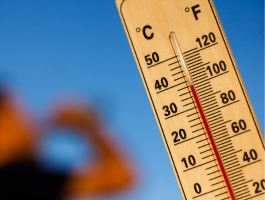.png)
As agency nurses, you are the backbone of the healthcare industry, providing invaluable support to medical facilities when they need it the most. However, working during a heatwave can present its own unique set of challenges. The scorching temperatures can take a toll on your well-being and affect your ability to deliver optimal patient care. To help you navigate these challenging conditions, we have compiled a comprehensive list of essential tips to help agency nurses beat the heat during a heatwave.
Stay Hydrated: When temperatures rise, staying hydrated becomes paramount. Always keep a water bottle with you and make a conscious effort to drink water regularly. Dehydration can lead to fatigue, dizziness, and decreased cognitive function, which can be detrimental to your ability to provide quality care. Avoid excessive caffeine or sugary drinks, as they can contribute to dehydration. Set reminders to ensure you are drinking water at regular intervals.
Dress Appropriately: Choosing the right clothing can make a significant difference in keeping you comfortable during a heatwave. Opt for lightweight, breathable clothing made of natural fibres such as cotton or linen. These materials allow air to circulate, promoting better airflow and reducing perspiration. Dark colours absorb heat, so opt for light-coloured attire instead. If your facility permits, consider wearing a cooling vest or neck wrap to help regulate your body temperature. Don't forget to protect yourself from the sun by wearing a wide-brimmed hat and using sunscreen.
Take Breaks in Cool Areas: During your breaks, seek out cool areas within the facility. Look for air-conditioned rooms or shaded outdoor spaces where you can relax and recharge. Utilise these moments to escape the heat and rejuvenate yourself. If possible, find a space with comfortable seating where you can elevate your feet to combat swelling caused by the heat.
Use Cooling Accessories: Invest in cooling accessories to keep yourself comfortable throughout your shift. Portable fans can provide instant relief by creating a breeze. Cooling towels soaked in cold water can be draped around your neck or forehead to help cool down your body temperature. Personal misting fans can also be effective in providing a refreshing burst of cool air. Additionally, cooling gel pads or ice packs can be placed on pulse points, such as the wrists or neck, to help cool down your body.
Adjust Your Schedule: If your agency allows for flexibility, try to adjust your schedule to avoid working during the hottest hours of the day. Consider taking early morning or evening shifts when temperatures tend to be more bearable. By avoiding the peak heat of the day, you can minimise your exposure to extreme temperatures and reduce the risk of heat-related illnesses. Discuss your preferences with your agency to see if they can accommodate your needs.
Maintain a Healthy Diet: Eating light, nutritious meals can help your body cope with the heat. Include fresh fruits and vegetables in your diet to provide essential vitamins and minerals. These foods often have high water content and can contribute to your overall hydration. Avoid heavy, greasy foods that can make you feel sluggish and further contribute to dehydration. Opt for smaller, more frequent meals to maintain energy levels and prevent feeling overly full in the heat.
Practise Self-Care: Heatwaves can be physically and mentally draining. Prioritise self-care to ensure your well-being remains intact. Get enough restful sleep to help your body recover and rejuvenate. During your downtime, engage in relaxation techniques such as deep breathing exercises, meditation, or yoga to reduce stress levels. Find activities that help you unwind and make time for hobbies or leisure activities that bring you joy. Taking care of yourself will enable you to provide better care to your patients.
Be Aware of Heat-Related Illnesses: Educate yourself about the signs and symptoms of heat-related illnesses such as heat exhaustion and heatstroke. Watch out for warning signs in yourself and your colleagues. Common symptoms include excessive sweating, dizziness, fatigue, headache, rapid heartbeat, and muscle cramps. If you or anyone else shows signs of heat-related illness, take immediate action, such as moving to a cooler area, loosening tight clothing, and seeking medical attention if necessary. Remember, prompt intervention is essential in preventing the progression of heat-related illnesses.
As agency nurses, you play a vital role in maintaining the healthcare system's integrity during heatwaves. By following these essential tips, you can protect yourself from the adverse effects of extreme heat and continue delivering excellent care to your patients. Remember to stay hydrated, dress appropriately, take breaks in cool areas, and use cooling accessories to beat the heat. Adjusting your schedule, maintaining a healthy diet, practising self-care, and being aware of heat-related illnesses are also crucial in ensuring your well-being. Remember, your well-being matters, and taking care of yourself is essential for providing top-notch care to those in need. Stay cool, stay safe, and keep making a difference!